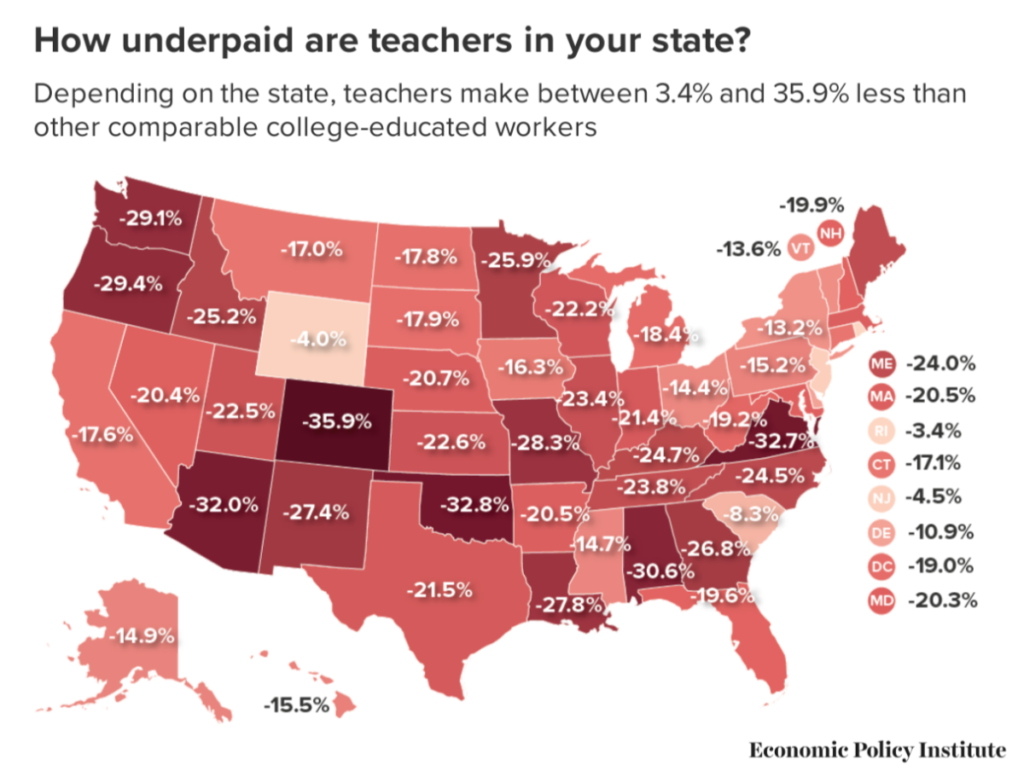Despite all the rhetoric from Tennessee policymakers about funds for schools and teacher salaries, Tennessee teachers continue to experience a “wage gap.” That is, teachers in Tennessee earn nearly 24% less than similarly educated peers.
The Economic Policy Institute has once again published its analysis of teacher pay relative to the pay of similar professionals and found that at a national level, the wage gap is 23.5%. In Tennessee, that gap is 23.8%. As EPI notes, in 28 states, the gap is greater than 20%. Yes, even when you add the benefits package (typically more generous than in other jobs), the penalty is still well above 10%.

What does this mean, though?
Well, all those stories about a teacher shortage start to make sense. Whether there are more actual vacancies this year than in years past (as seems to be the case in some districts), the issue is being talked about more seriously this year.
The numbers from EPI indicate that the value proposition for teachers just isn’t that great. Combine that with heated political rhetoric about “groomer teachers” and book banning, and you may begin to understand why there aren’t as many qualified educators available and eager to fill all the vacancies.
Here’s more from EPI on how they conducted the study:
First, we use Current Population Survey Outgoing Rotation Groups (CPS-ORG) data for the wage analyses. We focus on weekly wages, which avoids comparisons of weekly hours worked or length of the work year (i.e., the “summers off” issue for teachers) between teachers and other college graduates.3 The sample is restricted to full-time workers (working at least 35 hours per week), 18 to 64 years old, with at least a bachelor’s degree. The education restriction is made because teachers today need at least a bachelor’s degree to teach. The sample is further limited to those who reported their wage information directly (i.e., nonresponders whose wage data was imputed by BLS are excluded).
Trends Over Time
In 1979, teachers earned $1,052 per week (in 2021 dollars), which is 22.9% less than the $1,364 earned by other college graduates. The difference in wages between teachers and other college graduates decreased slightly into the mid-1990s, falling to 15.7% in 1996, but then increased considerably during the tight labor markets of the late 1990s into the early 2000s. The wages of nonteacher college graduates jumped by 13.5% from 1996 to 2002 during an unusual time of exceptional wage growth among low-, middle-, and high-wage earners. But inflation-adjusted wages of teachers did not grow strongly during this period, in part because teacher pay is often set by long-term contracts, and public-sector wages are not as volatile (they do not rise and fall as much) as private-sector wages. Teacher weekly wages remained flat in inflation-adjusted terms from 1996 to 2002, increasing just 0.3%, leaving the real average weekly wage of teachers 25.5% less than their college graduate counterparts.
This difference remained fairly consistent, with some ups and downs, throughout the 2000s. But, a significant widening of the wage gap has occurred since 2010 as teacher wages remained relatively flat while wages of other college graduates took off. The difference increased by 7.6 percentage points between 2010 and 2021—leaving the average weekly wages of teachers 32.9% behind that of other college graduates by 2021, the largest difference recorded in our series.
Now, though, we’re still looking at wage gaps of around 24% – in part due to a tight labor market in other professions increasing overall salaries. Of course, available federal stimulus funds and states with budget surpluses have meant some increases in teacher compensation – still, it is not enough to achieve anything like parity with other professions.
As EPI notes:
Generally, the teacher wage penalty has been on a worsening trajectory since the mid-1990s. A slight shrinking of the gap in 2019 was short lived. It widened again in 2020, to 21.6%, and in 2021, the penalty reached a record 23.5%. That means that, on average, teachers earned just 76.5 cents on the dollar compared with what similar college graduates earned working in other professions—and much less than the relative 93.9 cents on the dollar that teachers earned in 1996.
For more on education politics and policy in Tennessee, follow @TNEdReport
Your support – $5 or more – makes publishing education news possible.